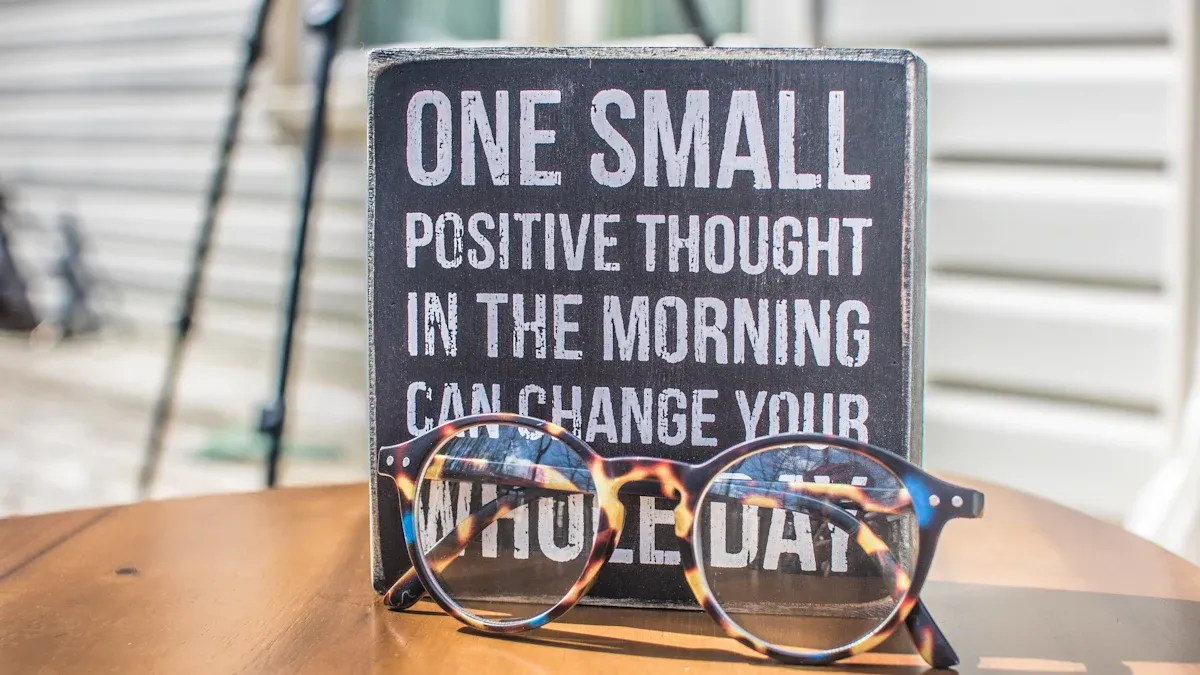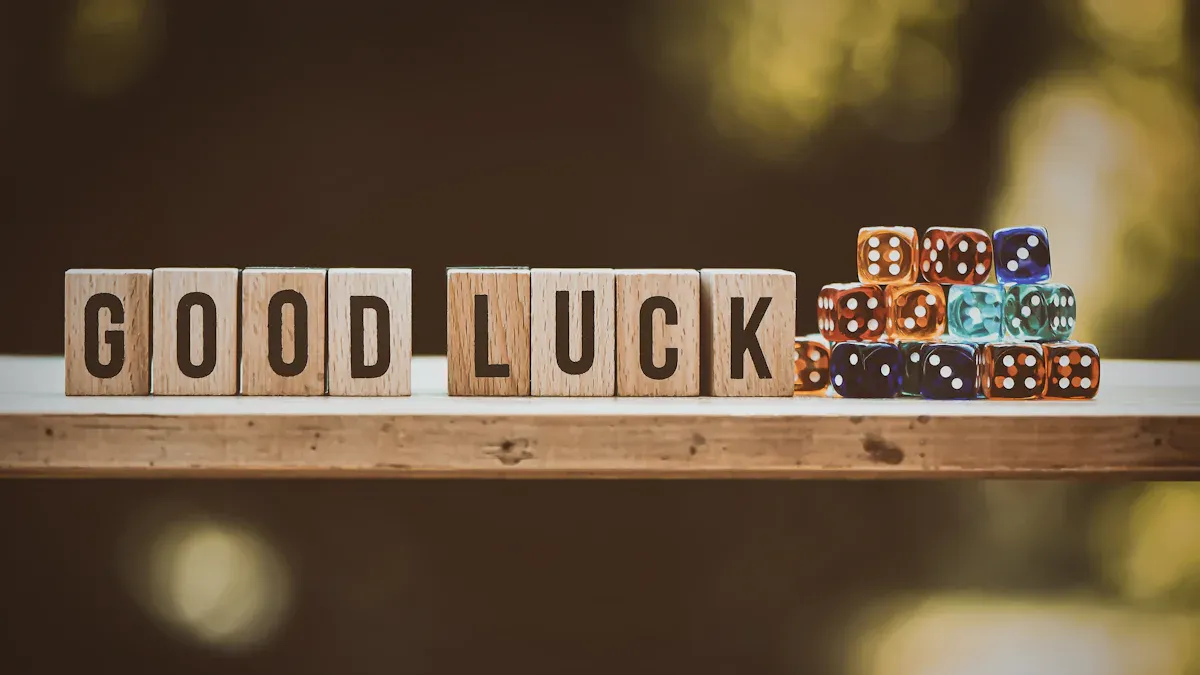How to Apply the Science of Luck in Everyday Life

Ever wonder why some people seem to catch lucky breaks while others miss out? You can actually influence your own luck with small changes in your attitude and actions. The science of luck shows that you have more power than you think. Try new things and stay open to fresh ideas. If you shift your mindset, you might notice more good things happening around you.
Tip: Take one small risk each day. You could open doors you never expected.
Key Takeaways
Your mindset shapes your luck. Stay positive and open to new experiences to spot more opportunities.
Take small risks daily. Trying new things can lead to unexpected lucky breaks.
Practice gratitude. Acknowledging the good in your life can attract more positive events.
Help others. Acts of kindness strengthen connections and can lead to new opportunities for you.
Learn from setbacks. Viewing challenges as growth opportunities can make you luckier in the future.
Science of Luck

You might think luck is just random chance, but the science of luck tells a different story. Your mindset and actions can shape how lucky you feel and what opportunities come your way. Researchers have found that luck is not only about chance. You can influence it by changing how you think and behave.
Mindset Matters
Your mindset plays a huge role in the science of luck. People who believe they can improve and grow often spot more chances and bounce back from setbacks. Dr. Richard Wiseman studied lucky people and found they share some key traits:
They look for new opportunities.
They keep a positive attitude.
They stay open to new experiences.
Carol Dweck’s work on growth mindset shows that when you believe you can get better, you try harder and see challenges as chances to learn. Optimism helps you stay strong and open to good things, while a negative outlook can make you miss out. You can boost your luck by:
Challenging your own biases.
Practicing daily habits that help you notice surprises.
Using tricks like the “serendipity hook” to connect with others.
Tip: Try to spot one unexpected opportunity each day. You might be surprised at what you find!
External Factors
Luck isn’t only about your mindset. The science of luck also looks at outside forces that shape your life. Things like family, friends, and even world events can change your path. For example, the COVID-19 pandemic affected many people’s jobs and plans. Sometimes, financial problems pop up out of nowhere. Even politics and market changes can play a part.
Here’s a quick look at some external factors:
External Factor | Description |
|---|---|
Historical Events | Big events like pandemics can change your life and plans. |
Family and Friends | People close to you can influence your choices and luck. |
Unexpected Financial Problems | Money troubles can appear suddenly and affect your future. |
Random Selection in Politics | Sometimes, luck decides who gets picked for important roles. |
Market Inefficiencies | Changes in the economy can create lucky or unlucky breaks. |
Status Reinforcement Mechanisms | Social systems can make some people luckier than others. |
Attribution of Luck | How you explain your luck affects how you see yourself and others. |
Different cultures also see luck in unique ways. Italians, for example, believe more strongly in luck and hope than the French. They often feel the world is fair and safe, which helps them stay positive.
Many people think luck is just random, but the science of luck shows that your actions, mindset, and outside events all play a part. If you pay attention to these factors, you can start to shape your own luck.
Key Principles
Seek Opportunities
You can boost your luck by actively looking for new chances. The science of luck shows that lucky people don’t just wait for good things to happen—they go out and find them. When you keep your eyes open and stay curious, you notice things others might miss. This is called having a "prepared mind." If you learn new skills, talk to different people, and try new activities, you create more chances for lucky breaks.
Build strong social networks. Meeting new people can lead to unexpected opportunities.
Stay open to new experiences. Even small changes, like taking a different route to school or joining a club, can make a big difference.
Use positive affirmations. Try saying, "I am a lucky person and today is going to be another lucky day." This can help you spot good things around you.
Tip: If you feel nervous about trying something new, remember that even small steps count. Say yes to one new thing each week.
Research shows that people who think of themselves as lucky tend to notice more opportunities. In one study, lucky people spotted a cash prize ad while unlucky people missed it because they felt anxious. Expanding your network also helps. Weak ties—like friends of friends—often lead to surprising chances. The science of luck proves that interacting with more people increases your odds of lucky encounters.
Action | How It Helps You Get Lucky |
|---|---|
Meeting new people | Opens doors to new opportunities |
Learning new skills | Prepares you for unexpected events |
Staying curious | Helps you notice hidden chances |
Trust Intuition
Sometimes, your gut feeling knows best. The science of luck suggests that intuition can guide you toward good decisions, especially when you don’t have all the facts. Your brain uses past experiences to spot patterns quickly. This process happens so fast you might not even realize it.
Listen to your instincts when making choices. If something feels right, it might be worth a try.
Don’t ignore your feelings. They can help you avoid mistakes or spot a lucky break.
Practice making small decisions based on intuition. Over time, you’ll get better at trusting yourself.
Studies show that people often prefer intuition over careful thinking when making decisions about what feels authentic. Brain scans reveal that emotional processing plays a big role in lucky choices. Intuition is like a shortcut—your mind matches current situations with memories, leading to quick insights. Hunters and parents have relied on intuition for survival, proving its value over time.
Note: If you feel stuck, pause and ask yourself what your gut is telling you. Sometimes, the answer comes before you even think about it.
Expect Positivity
Believing that good things will happen can actually make them more likely. The science of luck highlights that optimistic people keep trying, even when things get tough. If you expect positive outcomes, you’re more likely to work toward your goals and spot lucky breaks.
Use positive self-talk. Remind yourself that you can handle challenges and good things are possible.
Focus on what’s going well. This helps you stay motivated and notice new opportunities.
Surround yourself with positive people. Their attitude can rub off on you.
Research shows that optimism leads to better health and more success. People who expect good results keep going, even when faced with obstacles. Over time, positive expectations can lead to more independent and successful outcomes. One study found that parents who believed in their children’s future saw better results for them.
Tip: Start each day by thinking of one thing you’re excited about. This simple habit can shift your mindset and help you attract luck.
Transform Setbacks
Everyone faces setbacks, but you can turn them into stepping stones. The science of luck teaches that learning from mistakes makes you stronger and luckier in the future. If you see challenges as chances to grow, you build resilience and gain valuable insights.
Reflect on what went wrong and what you can learn.
Stay flexible and try new solutions when things don’t work out.
Celebrate small wins, even after a setback.
Many successful people have turned failures into opportunities. Walt Disney got fired and had a failed studio before creating his empire. J.K. Rowling faced rejection after rejection but kept writing until Harry Potter became a hit. Oprah Winfrey overcame tough times to become a media leader. These stories show that setbacks can lead to greater luck if you keep going.
Embracing setbacks helps you develop coping skills.
Learning from failure gives you insights for future success.
Resilience makes you ready for the next opportunity.
Note: When you face a setback, ask yourself, "What can I learn from this?" Every mistake is a chance to get luckier next time.
Gratitude and Compassion

Practice Gratitude
You might think luck is all about chance, but feeling grateful can actually make you luckier. When you practice gratitude, you start to notice more good things in your life. Studies show that people who feel thankful often experience more positive events and even better health. If you want to boost your luck, try simple gratitude exercises like keeping a journal or writing thank-you notes.
Here are some easy ways to practice gratitude:
Write down three good things that happened today.
Say “thank you” to someone who helped you.
Take a moment to enjoy something you love, like a sunny day or a favorite snack.
Researchers found that gratitude leads to more happiness and less stress. You might feel a 10% boost in happiness and a 35% drop in feeling down when you stick with these habits. Gratitude also helps you see challenges in a positive light and cope better with tough times.
Study | Findings |
|---|---|
Sun and Kong | |
Datu and Mateo | Meaning in life connects gratitude and happiness in Filipino students. |
Unanue et al. | Gratitude predicts future life satisfaction in Chilean adults. |
Grateful people often have better relationships, lower stress, and even healthier hearts. You can see these benefits in your own life when you make gratitude a daily habit.
Help Others
Helping others doesn’t just make you feel good—it can also make you luckier. When you show compassion, you build stronger connections with people around you. These bonds can lead to new opportunities and support when you need it most. Kind acts, like volunteering or lending a hand, create a ripple effect in your community.
Helping others reduces loneliness.
Volunteering encourages more kindness and a positive atmosphere.
People are more likely to help you if you’ve helped them or others before. Compassion spreads quickly, making everyone feel more supported and lucky. When you lift someone up, you might find that good things come back to you in surprising ways.
Finding | Description |
|---|---|
Positive Emotions | |
Willingness to Help | Folks are more likely to help when someone faces tough situations. |
Tip: Try doing one kind thing for someone each week. You’ll notice your own luck—and theirs—start to grow.
Luck isn’t just random. You shape it with your actions and attitude. Here’s what research shows:
People who stay positive and open-minded spot more chances.
Your mindset and daily habits help you feel in control.
Both your choices and outside events matter.
Try these steps every day:
Expand your network and be proactive.
Practice gratitude and mindfulness.
When you help others, you spread luck even further. Why not start today? 😊
FAQ
How can I become luckier every day?
You can try new things, meet new people, and stay positive. Look for chances to learn or help others. Keep a gratitude journal. Small steps add up!
Tip: Say yes to one new opportunity this week. You might surprise yourself!
Does luck only depend on my actions?
No, luck also comes from outside events like family, friends, or world changes. You control your attitude and choices, but some things happen by chance.
What You Control | What You Can't Control |
|---|---|
Your mindset | World events |
Your actions | Random chance |
Can I change my luck after a setback?
Yes! You can learn from mistakes and try again. Use setbacks as lessons. Stay flexible and keep going. Many successful people turned failures into lucky breaks.
Reflect on what happened.
Try a new solution.
Celebrate small wins.
Is helping others really linked to luck?
Helping others builds strong connections. People remember kindness and may help you in return. Compassion spreads good vibes and opens doors for everyone.
Note: One kind act can start a chain of good luck for you and your community.
See Also
Join Us at Banish Cancer – A Place of Hope
Simplifying B-Cell Prolymphocytic Leukemia for Better Understanding
Recognizing LGL Leukemia: Symptoms, Diagnosis, and Treatment Insights
Exploring Chronic Lymphocytic Leukemia: An Overview of Its Nature
Understanding Basal Cell Carcinoma: Symptoms and Identification Guide

